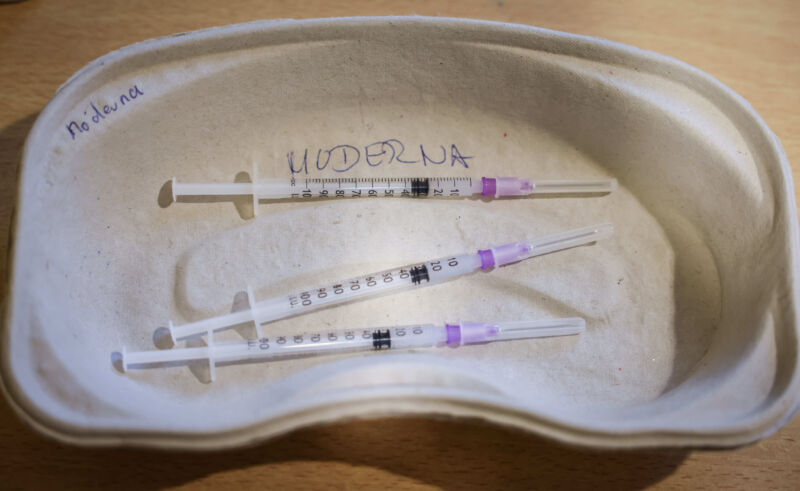
The Food and Drug Administration has authorized booster doses of both the Pfizer-BioNTech and Moderna COVID-19 vaccines for all people ages 18 and up, the companies announced separately this morning.
The boosters are to be given at least six months after a person’s second dose and, according to Moderna, can be used for mix-and-match boosting. That is, people who received two Pfizer-BioNTech vaccine doses earlier this year could get a Moderna booster and vice versa.
Preliminary data released last month from a mix-and-match booster trial run by the National Institutes of Health found that Moderna boosters appeared to generate the highest antibody levels overall, including in people who had previously received two doses of the Pfizer-BioNTech vaccine. However, the trial used a full dose of the Moderna vaccine (100 micrograms) for a booster, whereas the FDA has authorized a half-dose shot (50 micrograms) for boosters. It’s unclear if the half dose offers the same edge over boosting with a third Pfizer-BioNTech shot, which is given at the same dosage as the first two shots (30 micrograms).
Regardless, the mix-and-match trial and clinical data from the two companies all found boosters to be safe and highly effective at restoring waning coronavirus antibodies to high levels.
“Today’s FDA decision is supported by clinical data showing robust immune responses following a booster dose of our vaccine, exceeding what has been seen even after the completion of the highly effective two-dose primary schedule,” BioNTech CEO and co-founder Ugur Sahin said in a statement. “These data suggest a booster dose of our vaccine has the potential to maintain a high level of protection against tested variants, including delta.”
Today’s booster authorization greatly expands access to third shots and concludes a months-long effort by the Biden administration to offer boosters for all. The push for boosters has generated tension among experts and regulators, given that the vaccines have sustained high levels of protection against severe disease and death. Earlier, the FDA had only authorized boosters of the Pfizer-BioNTech and Moderna mRNA vaccines for certain groups, namely: people ages 65 and older, people with underlying medical conditions, and people who work or live in high-risk settings. (All people ages 18 and up who received a Johnson & Johnson COVID-19 vaccine are already eligible to receive any COVID-19 vaccine as a booster.)
Following the FDA’s authorization decision, the CDC’s panel of independent vaccine experts will take up the matter to set official federal policy. They will meet today (Friday) at noon Eastern time for a relatively short three-hour meeting. The CDC panel—the Advisory Committee on Immunization Practices—will likely review the data and vote on whether to recommend booster doses for all adults. If they vote in favor, CDC director Dr. Rochelle Walensky will likely sign off on the recommendation quickly. If so, booster doses for all adults could become available nationwide over the weekend.
A handful of states and cities have charged ahead of the FDA and CDC process. Booster doses are already open to all in several states, including Arkansas, California, Colorado, and New Mexico, as well as in New York City.
https://arstechnica.com/?p=1814284

